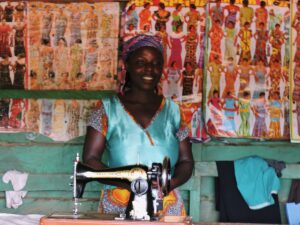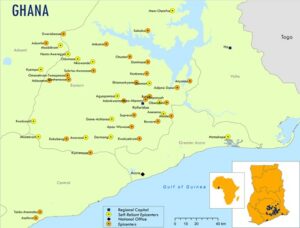Ghana
In Ghana, one of the most developed countries in West Africa, less than half of all women have received secondary education and almost a third of the population lives on less than $1.25 a day.
The capital of Ghana, Accra, is one of the richest and most modern cities on the continent and is currently experiencing a period of rapid growth and urbanization. Income has grown at an average annual rate of 4% per capita over the last 15 years. This was the result of high commodity prices, good trade conditions, macroeconomic stability and structural reforms.
Although the country’s GDP continues to grow with oil production, gold mining and other industries, most of this wealth is not distributed among the population because of the high level of corruption. Most of the poor in Ghana live in rural areas without basic services such as health care and clean water. Smallholders, who are most affected by rural poverty in Ghana, depend on outdated agricultural tools and have no access to improved seeds and fertilizers to increase crop yields.
Ghana (bordering Côte d’Ivoire, Burkina Faso and Togo) was the first colonial country in sub-Saharan Africa to gain independence in 1957. After a period of turbulence with several military coups, a stable democracy was established in the 1990s that has survived to this day.
Recent successes
Ghana has long been supported by THP Switzerland. Recently the following successes have been achieved:
In 2019, two Epicenters in Ghana, Agyapomaa and Ponponya, which supported the Hunger Project Switzerland, achieved independence and are now independent. Thus, a total of 9,383 people in 17 communities could be reached. The Hunger Project Switzerland was able to contribute a total of CHF 156,547 to this success in 2019.
The Agyapomaa Epicenter currently scores 84.64 points out of the required 80 points in the independence test. The epicenter shows the following remarkable results:
- no members of the epicenter community suffer from severe hunger
- 84% of community members are convinced that women and men share responsibility for household decisions
- 80% of households use improved sanitary facilities
- 94% of children of school age attend school
- 77% of children sleep under a mosquito net
- Score on the Women Empowerment Index (WEI): 74.92 out of 100 possible points
The Ponponya Epicenter scores 81.7 points out of the required 80 points in the independence test. The epicenter has the following results:
- Mobilization of the community:
- 81% of members of the epicenter community consider themselves capable of changing their community
- 84% of the members participated in the last elections
- no members of the epicenter community suffer from severe hunger
- all small farmers apply improved farming practices
- 91% of children attend school regularly
- 31% of women own a small business
- the number of children under 5 years of age with diarrheal diseases has decreased by 48
- Score on the Women Empowerment Index (HOW): 78.48 out of 100 possible points
Travel Report

THP sites in Ghana

Home > Who we are > THP Switzerland > Ghana
Ghana
In Ghana, one of the most developed countries in West Africa, less than half of all women have received secondary education and almost a third of the population lives on less than $1.25 a day.
The capital of Ghana, Accra, is one of the richest and most modern cities on the continent and is currently experiencing a period of rapid growth and urbanization. Income has grown at an average annual rate of 4% per capita over the last 15 years. This was the result of high commodity prices, good trade conditions, macroeconomic stability and structural reforms.
Although the country’s GDP continues to grow with oil production, gold mining and other industries, most of this wealth is not distributed among the population because of the high level of corruption. Most of the poor in Ghana live in rural areas without basic services such as health care and clean water. Smallholders, who are most affected by rural poverty in Ghana, depend on outdated agricultural tools and have no access to improved seeds and fertilizers to increase crop yields.
Ghana (bordering Côte d’Ivoire, Burkina Faso and Togo) was the first colonial country in sub-Saharan Africa to gain independence in 1957. After a period of turbulence with several military coups, a stable democracy was established in the 1990s that has survived to this day.
Recent successes
Ghana has long been supported by THP Switzerland. Recently the following successes have been achieved:
In 2019, two Epicenters in Ghana, Agyapomaa and Ponponya, which supported the Hunger Project Switzerland, achieved independence and are now independent. Thus, a total of 9,383 people in 17 communities could be reached. The Hunger Project Switzerland was able to contribute a total of CHF 156,547 to this success in 2019.
The Agyapomaa Epicenter currently scores 84.64 points out of the required 80 points in the independence test. The epicenter shows the following remarkable results:
- no members of the epicenter community suffer from severe hunger
- 84% of community members are convinced that women and men share responsibility for household decisions
- 80% of households use improved sanitary facilities
- 94% of children of school age attend school
- 77% of children sleep under a mosquito net
- Score on the Women Empowerment Index (WEI): 74.92 out of 100 possible points
The Ponponya Epicenter scores 81.7 points out of the required 80 points in the independence test. The epicenter has the following results:
- Mobilization of the community:
- 81% of members of the epicenter community consider themselves capable of changing their community
- 84% of the members participated in the last elections
- no members of the epicenter community suffer from severe hunger
- all small farmers apply improved farming practices
- 91% of children attend school regularly
- 31% of women own a small business
- the number of children under 5 years of age with diarrheal diseases has decreased by 48
- Score on the Women Empowerment Index (HOW): 78.48 out of 100 possible points
Travel Report

THP sites in Ghana


